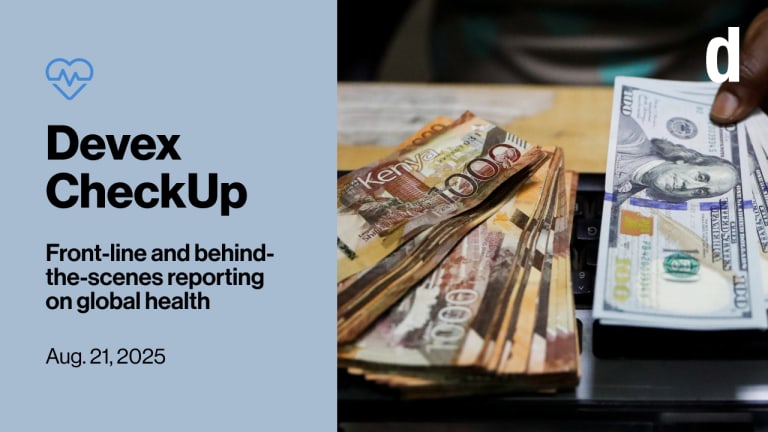
GENEVA — Antimicrobial resistance is not on the official agenda of the 71st World Health Assembly in Geneva this week. But as member states discuss issues around access to quality and affordable medicines, public health preparedness and response, and universal health coverage, the threat and gravity of the so-called “superbugs” has been hard to ignore.
What’s worrying is that the world doesn’t have “a good handle on the size of the problem,” according to Dame Sally Davies, the United Kingdom’s chief medical officer, who has often referred to the threat of AMR as a “post-antibiotic apocalypse.”
Devex spoke to Davies, a former member of the World Health Organization’s executive board and a vocal advocate on the issue of AMR, at the WHA meeting about the current situation and what more the aid community could do to halt its spread.
The conversation has been edited for length and clarity.
What concerns you most with AMR?
I think we have a slow-rising epidemic of people dying of drug-resistant infections, or being damaged by drug-resistant infections. A conservative estimate is 700,000 deaths a year at the moment across the world; in reality it will be rather more than that. And it’s hidden, because people don’t understand that the infection they’re being treated for was not responding to those treatments.
Combine that with the fact that we have an empty pipeline of drugs, and you get a very worrying picture as we go forward. This is not a sexy subject, and it’s a very dense scientific area, and it’s very hidden. The patient faces are missing, but it matters.
“Never forget that at the moment, more people die because they don’t get antibiotics than die of drug-resistant infections. It’s just that those numbers are changing.”
— Dame Sally Davies, U.K. chief medical officerWhere do you think the problem lies?
This is like climate change. It’s incredibly complex. It’s caused by using the drugs. Let’s talk about bacteria and antibiotics — so even people who need antibiotics are at risk of a mutational change in the bugs that they’ve got while they are being treated that will cause resistance, and then can spread.
Clearly the more we use antibiotics, the more resistance will grow, so any overuse matters. We overuse them in the human sector, we overuse them in the animal sector, in fish farming, in agriculture. So we have to do everything we can to reduce infection in the first place: Handwashing, clean water, sanitation, infection prevention, and control in hospitals and in animal husbandry. We have to take the host, wield it apart, and put it together again, preventing infection and treating where it’s needed.
Never forget that at the moment, more people die because they don’t get antibiotics than die of drug-resistant infections. It’s just that those numbers are changing. The access problem numbers are coming down, and resistance numbers are going up.
What tools should be in place for the global community to fully tackle this problem, versus what’s currently in place?
We don’t have a good handle on the size of the problem. We need global surveillance that’s effective, not just in the human sector, but in animals, fish farming, and everything. We’ve discovered there’s quite a big problem in the environment, with environmental contamination; we need lots more studies on surveillance and monitoring of what’s going on.
We need monitoring of industry as they make antibiotics and other anti-infectives, to make sure they’re not spewing them out into the environment. We need to know the size of the problem. We need education of the public and professionals, whether they’re vets, whether they’re nurses, pharmacists, or doctors.
How would you describe the way the aid community approaches the subject?
It’s still being seen too much as a problem of the human health system. While that is probably the main driver — and that’s where the pain and the deaths come — we need a much more cross-sectoral response. And we’re getting there.
What role does the Interagency Coordination Group on AMR, of which you are a part of, play in addressing the problem?
It was set up by the United Nations secretary-general following the 2016 high-level meeting on AMR at the U.N. General Assembly, with a remit to look at who was doing what, where are the gaps, what are they, who needs to do what, and propose a future governance for AMR globally to the secretary-general. We’re halfway through our work. We will submit our report to the secretary-general early next summer.
Is there another high-level meeting on AMR happening?
We are expecting nations to call for one next year, alongside the one on universal health coverage. But now is too early to say.
Devex is on the ground at the 71st World Health Assembly in Geneva. Follow reporters @JennyLeiRavelo and @vchadw for updates, and keep an eye out for more stories to follow.








